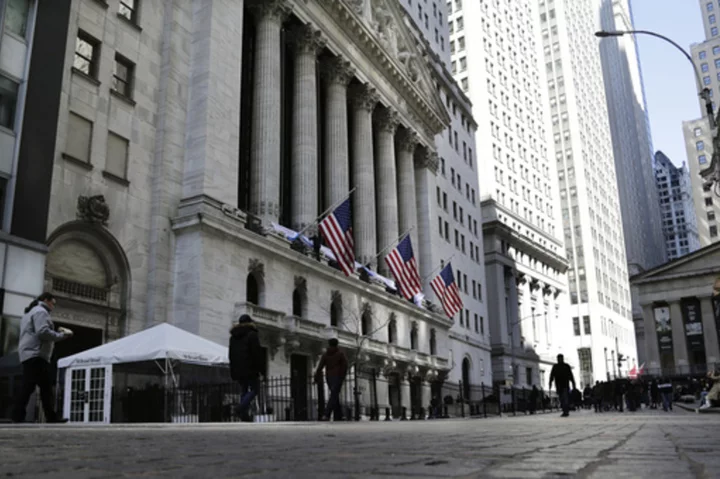Crude prices have fallen every day this week save for one and drillers are getting hit hard as potential economic headwinds raise anxiety once again over a recession.
Futures for the Dow Jones industrials and the S&P 500 shuffled between small gains and losses before the opening bell Thursday.
Benchmark U.S. crude oil are down another 91 cents to $83.31 a barrel in electronic trading on the New York Mercantile Exchange early Thursday, a day after tumbling almost 6%, the biggest drop in just over a year.
Crude had hovered above $90 last month due largely to production cuts announced in July by Saudi Arabia and Russia. However, there is little evidence of strong demand for crude and after Saudi said Wednesday that it would stick to a production cut of 1 million barrels of oil a day through the end of the year oil prices did not rise, they fell.
Crude has now declined more than 11% since topping $93 last week.
Brent crude, the international standard, gave up 82 cents to $84.99 per barrel.
“The main story remains demand destruction, as gasoline stocks have seen a significant build-up,” Stephen Innes, managing partner at SPI Asset Management, said in a commentary.
Crude prices fell after the Energy Information Administration reported a 4.6 million barrel increase in commercial petroleum products. Inventories of gasoline rose to above average and the margins refineries can charge for their finished product is under pressure.
Energy companies slid again Thursday, with shares in major producers Exxon, Chevron, BP and ConocoPhillips all down between 3% and 6% this week.
Economists and investors view demand for oil and gas as an indicator of broader economic health. When demand for energy products trails off, it often means broader demand for other products and services is also in decline.
The upside is that lower energy costs would relieve inflationary pressures that have led central banks to keep interest rates high.
Stocks have struggled since the summer under the weight of soaring Treasury yields in the bond market. High yields undercut stock prices by pulling investment dollars away from stocks and into bonds. They also crimp corporate profits by making borrowing more expensive.
The yield on the 10-year Treasury, which is the centerpiece of the bond market, continued to tick back from its highest level since 2007, down to 4.72% early Thursday from 4.73% late Wednesday.
After already hiking its main interest rate to the highest level since 2001, the Fed has indicated it may keep its overnight rate higher next year than it had earlier expected. Treasury yields have correspondingly snapped higher as traders accept a new normal for markets of high rates for longer.
Those elevated interest rates are posing a threat to economic growth in the U.S. Economists at Goldman Sachs estimate that the economy is expected to have grown at a healthy 3.5% annual rate in the July-September quarter. Yet growth will likely slow to a meager 0.7% annual rate in the final three months of the year, Goldman estimates.
Higher interest rates have also but the brakes on the housing market. The average long-term U.S. mortgage rate jumped to 7.31% last week, its highest level in nearly 23 years. Higher rates, low home inventory and home prices near all-time highs have combined to push sales of previously occupied U.S. homes down 21% through the first eight months of this year versus the same stretch in 2022.
Wall Street is also absorbing the ouster of Kevin McCarthy as the speaker of the House of Representatives. The unprecedented move likely doesn’t change much in the short term, with funding for the U.S. government set until Nov. 17.
A shutdown would drag on the U.S. economy, raising the risk of a recession, though financial markets have held up relatively well through past shutdowns.
In premarket trading Thursday, shares of Clorox slid 3.8% after the company said that a cybersecurity attack would mean that first-quarter sales, profit and margins would be down significantly due.
At midday in Europe, France's CAC 40 and Germany's DAX each ticked up 0.3% while Britain's FTSE 100 tumbled 0.8%.
Japan's benchmark Nikkei 225 jumped 1.8% to finish at 31,075.36. Sydney's S&P/ASX 200 gained 0.5% to 6,925.50, while South Korea's Kospi was little changed, inching down less than 0.1% to 2,403.60. The Hang Seng index in Hong Kong gained 0.1% to 17,213.87.
In currency trading, the U.S. dollar fell to 148.90 Japanese yen from 149.02 yen. The euro cost $1.0525, up from $1.0504.
The S&P 500 climbed 0.8% on Wednesday, clawing back a big share of a tumble the day before. The Dow Jones Industrial Average rose 0.4%, a day after erasing the last of its gains for the year so far. The Nasdaq composite gained 1.4%.
____









